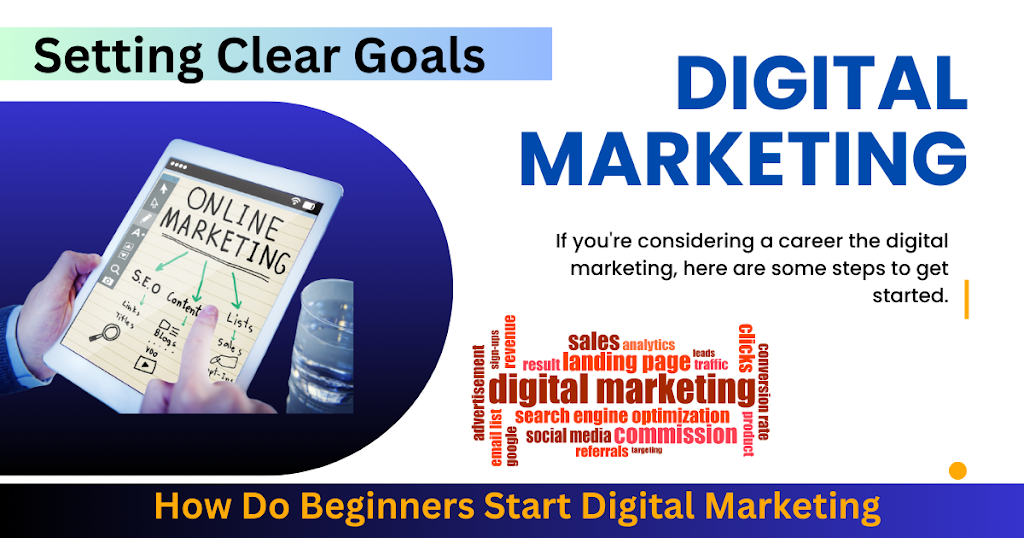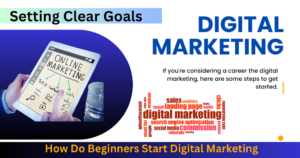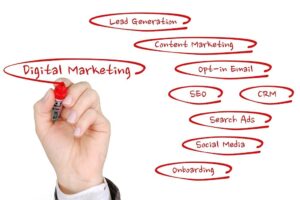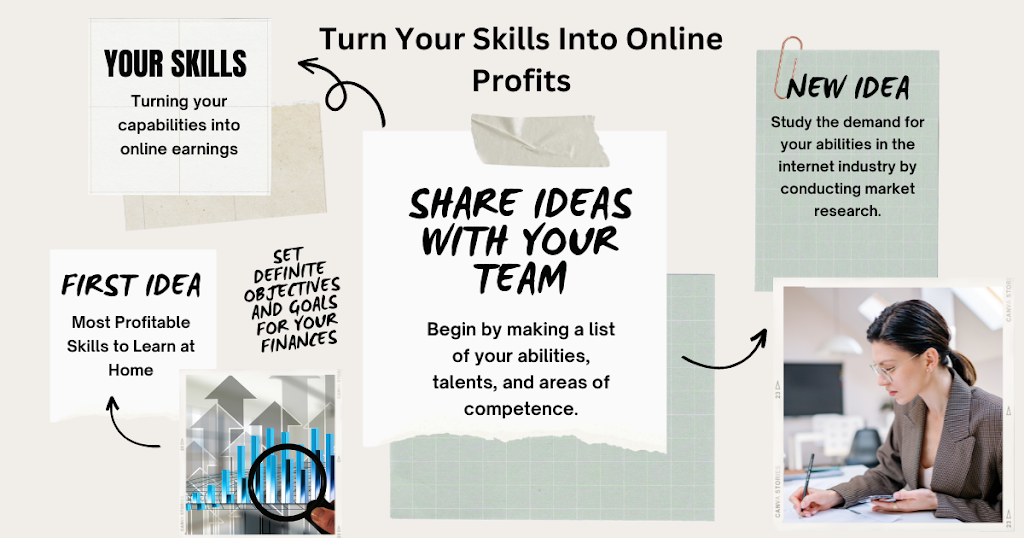How Do Beginners Start Digital Marketing:
Introduction
Table of Contents:
- Understanding Digital Marketing
- Setting Clear Goals
- Identifying Your Target Audience
- Choosing the Right Digital Marketing Channels
- Creating Quality Content
- Search Engine Optimization (SEO)
- Pay-Per-Click Advertising (PPC)
- Social Media Marketing
- Email Marketing
- Content Marketing
- Analytics and Data Tracking
- Budgeting and Resource Allocation
- Staying Updated and Adapting
- Conclusion
1. Understanding Digital Marketing
Before diving in, it’s vital to comprehend what digital marketing is. This chapter provides an overview of the digital marketing landscape, including its various channels and strategies, such as SEO, PPC, social media marketing, email marketing, and more.
2. Setting Clear Goals
Beginners should start by setting clear and measurable goals for their digital marketing efforts. Whether it’s increasing website traffic, generating leads, boosting sales, or enhancing brand awareness, having well-defined objectives will guide your strategy.
3. Identifying Your Target Audience
Knowing your target audience is fundamental to successful digital marketing. This chapter explores creating detailed buyer personas and using market research to understand your audience’s needs, preferences, and behaviors.
4. Choosing the Right Digital Marketing Channels
Every business is unique, and not all digital marketing channels are suitable for every situation. Learn how to select the right channels that align with your goals and target audience.
5. Creating Quality Content
Content is the heart of digital marketing. Discover how to create engaging and valuable content that resonates with your audience. This includes blog posts, videos, infographics, and more.
6. Search Engine Optimization (SEO)
SEO is essential for ranking your website higher in search engine results. Beginners will find guidance on optimizing their website for search engines and driving organic traffic.
7. Pay-Per-Click Advertising (PPC)
Learn how to create and manage PPC in campaigns on platforms like Google Ads and Bing Ads. Understand the basics of keyword research, ad creation, and budgeting.
8. Social Media Marketing
Explore the world of social media marketing, including strategies for popular platforms like Facebook, Instagram, Twitter, and LinkedIn. Discover how to build a social media presence and engage with your audience effectively.
9. Email Marketing
In the email, marketing remains a potent tool for nurturing leads and retaining customers. This chapter covers the essentials of building and maintaining an email list, crafting compelling email campaigns, and analyzing results.
10. Content Marketing
Delve deeper into content marketing strategies, including content distribution, guest posting, and influencer collaboration. Learn how to leverage content to establish authority in your niche.
11. Analytics and Data Tracking
Understanding the performance of your digital marketing efforts is critical. Explore various analytics tools and metrics to measure success and make data-driven decisions.
12. Budgeting and Resource Allocation
Allocate your budget wisely across different digital marketing channels. Discover strategies to maximize your ROI and stay within your financial constraints.
13. Staying Updated and Adapting
The digital marketing landscape is constantly evolving. Learn how to stay updated with industry trends and adapt your strategies accordingly to remain compete
How to Earn From Digital Marketing at Home:-
1. The Growing Opportunities in Digital Marketing
Digital marketing is a rapidly evolving field with an increasing demand for skilled professionals. We’ll delve into the reasons why the digital marketing landscape is ripe with opportunities for those looking to work remotely.
2. Essential Skills for Digital Marketing
Before you can start earning from digital marketing, it’s crucial to understand the fundamental skills required for success. We’ll cover topics like SEO, social media marketing, content creation, email marketing, and data analytics.
3. Setting Up Your Home Office
A productive home office is essential for remote work. Learn how to create an efficient workspace that fosters creativity and productivity.
4. Choosing Your Niche or Specialization
Discover the importance of finding your niche within the digital marketing space. Specializing in a specific area can help you stand out and attract clients or customers more effectively.
5. Building Your Online Presence
To succeed in digital marketing, you need a strong online presence. We’ll discuss strategies for building a personal brand and showcasing your expertise in your chosen niche.
6. Freelancing in Digital Marketing
Explore the world of freelance digital marketing, including how to find clients, set your rates, and manage your projects effectively.
7. Affiliate Marketing
Learn how affiliate marketing works and how you can earn commissions by promoting products or services from other companies on your website or social media platforms.
8. Selling Digital Products or Services
Discover how to create and sell your own digital products, such as ebooks, online courses, or templates, to generate a passive income.
9. Online Courses and Consultations
Explore the potential of offering online courses or consultations in your area of expertise, attracting clients or students who value your knowledge.
10. Monetizing a Blog or YouTube Channel
If you enjoy creating content, we’ll discuss how to monetize your blog or YouTube channel through advertising, sponsorships, and affiliate marketing.
11. Social Media Management
Find out how to offer social media management services to businesses looking to enhance their online presence and engage with their audience effectively.
12. Search Engine Optimization (SEO) Services
SEO expertise is highly sought after. Learn how to offer SEO services to improve website rankings and visibility.
13. Email Marketing Campaigns
Master the art of email marketing and help businesses create and execute effective email campaigns to engage their customers.
14. Tracking Your Progress and Success
Measuring your digital marketing efforts is crucial. Discover tools and metrics to monitor your progress and adapt your strategies for better results.
Is Digital Marketing a Good Career:-
In this article, we will explore whether digital marketing is a good career choice and the reasons why it continues to attract professionals from various backgrounds.
2. The Pervasiveness of Digital Marketing
Digital marketing has become an integral part the are almost every industry. From e-commerce and technology to healthcare and finance, businesses rely on digital marketing strategies to promote their products and services, making it a ubiquitous field with boundless opportunities.
3. Why Choose a Career in Digital Marketing?
Here are several compelling reasons why digital marketing can be an excellent career choice:
4. Diverse Career Opportunities
in digital marketing offers a diverse range of career opportunities. Whether you’re interested in content creation, data analytics, social media management, or SEO, there’s a niche for you to explore and specialize in.
5. Constant Learning and Adaptation
The digital marketing landscape evolves rapidly. This career demands continuous learning and adaptation to stay updated with the latest trends or technologies. For individuals who enjoy challenges and personal growth, this is a significant advantage.
6. High Demand and Competitive Salaries
Because there is a much greater demand than supply for digital marketing experts, incomes are competitive, and employment opportunities are secure. Companies are prepared to make investments in talented employees who can assist them in successfully navigating the digital world.
7. Entrepreneurial Opportunities
Digital marketing skills are invaluable for aspiring entrepreneurs. They can help you market your own products or services, reducing the need for extensive marketing budgets in the early stages of a business.
8. Work-Life Balance
Many digital marketing roles offer flexibility, allowing professionals to work remotely or choose flexible schedules. This work-life balance is appealing to those seeking greater control over their time.
9. Challenges and Considerations
While digital marketing offers numerous advantages, it’s essential to consider the challenges as well. These may include the need for ongoing education, dealing with rapid changes in algorithms and technologies, and the pressure to deliver measurable results.
10. How to Start a Career in the Digital Marketing
If you’re considering a career the digital marketing, here are some steps to get started:
- Educate Yourself: They begin by acquiring knowledge in key areas like SEO, social media marketing, email marketing, content creation, and data analytics.
- Gain Practical Experience: Personal projects, freelance work, and internships can all help you develop your skills and portfolio.
- Certifications: Consider earning certifications in platforms like Google Ads or HubSpot to boost your credibility.
- Networking: Connect with professionals in the field through social media, conferences, and local events to expand your opportunities.
- Stay Updated: Continuously learn about emerging trends and technologies by following industry news and taking relevant courses.
Can I Learn Digital Marketing in 1 Month:-
This article explores the feasibility of learning digital marketing in a short timeframe and guides how to make the most of your efforts.
1. The Complexity of Digital Marketing
Digital marketing is multifaceted, involving various components such as search engine optimization (SEO), pay-per-click advertising (PPC), social media marketing, content marketing, email marketing, and more. Each of these areas demands a deep understanding and practical experience to master.
2. Setting Realistic Expectations
While it’s possible to gain a foundational understanding of digital marketing in a month, becoming an expert in the field typically takes years of learning, practice, and adaptation. It’s essential to set realistic expectations and view your one-month effort as the starting point of your journey.
3. Month 1: Laying the Foundation
In your first month of learning digital marketing, your primary goal should be to establish a strong foundation. This will involve both theoretical knowledge and practical skills.
4. Weeks 1-2: Understanding the Basics
Digital Marketing Fundamentals: Begin by understanding the core concepts and principles of digital marketing. Familiarize yourself with key terminology and industry trends.
Website Basics: Learn the basics of website creation and design. Understanding the structure of websites is crucial for various digital marketing activities.
Content Creation: Explore content marketing fundamentals, including how to create compelling and valuable content for online audiences.
5. Weeks 3-4: Practical Application
Social Media Marketing: Dive into social media platforms like Facebook, Instagram, Twitter, and LinkedIn. Create profiles, explore advertising options, and understand how to engage with your target audience.
SEO and Keyword Research: Learn the basics of SEO and keyword research. Optimize a website or blog post for search engines.
Email Marketing: Understand the principles of email marketing, including list building, creating effective email campaigns, and measuring results.
6. Key Digital Marketing Components
To gauge your progress, focus on understanding and applying these key digital marketing components:
Content Creation and Marketing: Develop the ability to create high-quality content that resonates with your goal audience.
Website Optimization: Learn the fundamentals of optimizing websites for both users and search engines.
Social Media Management: Gain hands-on experience managing social media accounts and creating engaging content.
Basic Analytics: They understand how to track and analyze digital marketing performance using tools like Google Analytics.
7. Additional Learning Resources
To enhance your learning, consider online courses, tutorials, and resources provided by reputable platforms such as HubSpot Academy, Google Digital Garage, and Coursera.
8. The Role of Continuous Learning
Digital marketing is an ever-evolving field. Even after your initial month of learning, it’s essential to continue educating yourself, staying updated with industry trends, and gaining practical experience through ongoing projects.
Digital Marketing Free Course With Certificate:-
In this article, we’ll explore the value of these courses, how to find them, and the benefits of earning a digital marketing certificate.
Contents:
- The Value of Digital Marketing Courses
- Finding Free Digital Marketing Courses
- Choosing the Right Course
- Course Content and Certification
- Benefits of a Digital Marketing Certificate
- Popular Platforms Offering Free Digital Marketing Courses
- Tips for Success
1. The Value of Digital Marketing Courses
Digital marketing courses provide a structured and comprehensive way to learn the principles, strategies, and tactics used in online marketing. They help individuals understand how to effectively promote products, services, or brands in the digital sphere, which is crucial in today’s interconnected world.
2. Finding Free Digital Marketing Courses
The Internet is a treasure trove of free digital marketing courses, making it accessible to anyone with an Internet connection. These courses are often offered by reputable institutions, organizations, or platforms as a way to promote their expertise and provide value to learners.
3. Choosing the Right Course
Selecting the right digital marketing course is essential to maximize your learning experience. Consider your level of expertise (beginner, intermediate, advanced), your specific areas of interest (e.g., SEO, social media marketing, email marketing), and the credibility of the course provider.
4. Course Content and Certification
Free digital marketing courses typically cover a range of topics, including:
- Introduction to digital marketing
- Search engine optimization (SEO)
- Social media marketing
- Content marketing
- Email marketing
- Pay-per-click (PPC) advertising
- Analytics and data analysis
Upon completing a course, you’ll often receive a certificate of completion. While this certificate may not hold the same weight as a degree, it signifies that you’ve acquired valuable skills and knowledge in digital marketing.
5. Benefits of a Digital Marketing Certificate
Earning a digital marketing certificate offers several advantages:
- Resume Enhancement: It adds credibility to your resume and demonstrates your commitment to professional development.
- Skill Validation: It validates your digital marketing skills to potential employers or clients.
- Networking: Courses often include opportunities to connect with fellow learners and industry professionals.
- Self-Esteem: Completing a course and earning a certificate can boost your confidence in your digital marketing abilities.
6. Popular Platforms Offering Free Digital Marketing Courses
Some reputable platforms that offer free digital marketing courses with certificates include:
- Google Digital Garage: This offers a wide range of digital marketing courses, including fundamentals and specific topics like SEO and social media.
- HubSpot Academy: Provides free courses on inbound marketing, content marketing, email marketing, and more, along with certifications.
- Coursera: Offers free courses from top universities and institutions, many of which offer a certificate upon completion.
- edX: Provides free digital marketing courses from universities and institutions worldwide, with the option to receive a verified certificate for a fee.
7. Tips for Success
To make the most of your digital marketing course:
- Stay Consistent: Set aside dedicated time each day or week to study and complete course materials.
- Practice What You Learn: Apply the concepts practically by running your digital marketing campaigns or assisting others.
- Engage in Discussions: If the course offers a discussion forum, participate actively to learn from others and seek help when needed.
- Track Progress: Monitor your progress and revisit previous modules as necessary.
Which Skills is Best For Digital Marketing:-
In this post, we will explore the most important skills required for a successful career in digital marketing and how they contribute to effective online promotion.
2. The Multifaceted Nature of Digital Marketing
3. Core Skills for Digital Marketing Success
The following skills are fundamental for anyone aspiring to excel in digital marketing:
4. Analytical Skills
Understanding data and metrics is crucial. Digital marketers must analyze campaign performance, track user behavior, and make data-driven decisions to optimize strategies.
5. Content Creation and Copywriting
They are compelling and high-quality content is the backbone of digital marketing. Writing skills are essential for creating engaging blog posts, social media content, email campaigns, and more.
6. SEO (Search Engine Optimization)
Knowledge of SEO is vital to improve website visibility in search engine results. This skill involves keyword research, on-page optimization, and link building.
7. Social Media Marketing
8. Email Marketing
Email marketing remains a powerful tool for in-lead generation and customer retention. Skills in crafting effective email campaigns, list management, and segmentation are essential.
9. Paid Advertising (PPC)
Paid advertising through platforms like Google Ads and Facebook Ads requires expertise in keyword selection, ad creation, budget management, and A/B testing.
10. Data Analysis and Interpretation
Digital marketers must be proficient in using analytics tools to track and interpret data. This skill helps in measuring ROI, understanding user behavior, and making data-driven decisions.
11. UX/UI Design
A good understanding of user experience (UX) or user interface (UI) design principles can enhance website performance and user satisfaction.
12. Coding and Technical Skills
Basic coding knowledge, especially in HTML and CSS, can be valuable for making website improvements and customizing content.
13. Adaptability and Continuous Learning
The digital marketing landscape is constantly evolving. Marketers need the ability to adapt to new platforms, technologies, and trends. Continuous learning is key to staying competitive.
What is SEO in digital marketing:-
This article delves into what SEO is, its significance in digital marketing, how it operates, and the key components that shape its success.
2. Understanding SEO: An Overview
SEO is the practice of optimizing a website or online content to improve its ranking in search engine results pages (SERPs). It involves various strategies and techniques to enhance a website’s visibility to organic (non-paid) search engine traffic.
3. The Importance of SEO in Digital Marketing
SEO is the cornerstone of digital marketing for several reasons:
- Increased Visibility: A higher search engine ranking ensures your website is seen by a broader audience.
- Enhanced Credibility: Top-ranking websites are often perceived as more trustworthy and reliable by users.
- Cost-Effective: Organic traffic generated through SEO is cost-effective compared to paid advertising.
- Targeted Traffic: SEO allows you to attract users actively searching for products or information relevant to your website.
4. How Does SEO Work?
SEO operates based on search engine algorithms, which are complex sets of rules that determine how websites are ranked. The goal of SEO is to align your website with these algorithms to improve its ranking.
5. Key Components of SEO
SEO comprises three primary components:
6. On-Page SEO
On-page SEO focuses on optimizing individual web pages to improve their rankings. Key aspects include:
- Keyword Research: Identifying relevant keywords and phrases users might use to find your content.
- Content Optimization: Ensuring your content is high-quality, relevant, and well-structured with targeted keywords.
- Meta Tags: Optimizing meta titles and descriptions to entice users to click on your search result.
7. Off-Page SEO
Off-page SEO pertains to actions taken outside your website to improve its ranking. It includes strategies like:
- Backlink Building: Earning high-quality backlinks from reputable websites to establish authority.
- Social Signals: Engaging on social media platforms to boost your brand’s online presence.
8. Technical SEO
Technical SEO focuses on improving the technical aspects of your website to enhance its visibility and user experience. Key elements include:
- Website Speed: Ensuring fast page loading times.
- Mobile Optimization: Making your website mobile-friendly.
- Crawlability: Ensuring search engines can easily navigate and index your site.
9. SEO Tools and Resources
Numerous tools and resources are available to help with SEO, including:
- Keyword Research Tools: Examples include Google Keyword Planner, SEMrush, and Ahrefs.
- Analytics Platforms: Google Analytics and Google Search Console provide insights into website performance.
- SEO Plugins: Plugins like Yoast SEO for WordPress help optimize on-page SEO.
10. Measuring SEO Success
Measuring the success of your SEO efforts is crucial. Key metrics include:
- Rankings: Monitoring your website’s ranking for target keywords.
- Organic Traffic: Tracking the number of visitors from organic search results.
- Conversion Rate: Measuring how well your website converts visitors into customers or leads.
11. SEO Trends and Future Developments
SEO is continually evolving. Staying updated with trends like voice search optimization, mobile-first indexing, and user experience improvements is essential for long-term success.
Digital Marketing Benefits For Business:-
1. The Evolution of Marketing in the Digital Age
The digital age has transformed the way businesses connect with their audiences. Traditional marketing methods have given way to innovative digital strategies that enable businesses to reach a broader, more engaged audience.
2. Wider Reach and Global Presence
Digital marketing breaks down geographical barriers, allowing businesses to reach a global audience. Whether you’re a local store or an international corporation, the Internet provides a platform to showcase your products or services to a vast and the are diverse audience.
3. Targeted Marketing and Personalization
Digital marketing allows businesses to goal their own marketing efforts with pinpoint precision. Through data-driven strategies, you can tailor your content and advertisements to specific demographics, interests, and behaviors, ensuring your message resonates with the right audience.
4. Cost-Effective Advertising
They are compared to traditional advertising methods, digital marketing offers cost-effective solutions. With tools like pay-per-click (PPC) advertising and social media advertising, you can allocate your budget more efficiently, ensuring you get the most value for your investment.
5. Measurable Results and Analytics
Digital marketing offers some noteworthy benefits, one of which is the opportunity to monitor and evaluate every part of your efforts. Tools like Google Analytics offer in-depth information on user behavior, website traffic, and conversion rates. This data-driven strategy enables the optimization of marketing tactics and allows for informed decision-making.
6. Improved Customer Engagement
Digital marketing fosters better engagement with customers. Through social media, email marketing, and interactive content, businesses can establish meaningful connections with their audience. Customer feedback and interactions can also provide valuable insights for continuous improvement.
7. Competitive Advantage
8. Greater Flexibility and Adaptability
14. Conclusion
Sum up the key takeaways and emphasize the importance of continuous learning and adaptation in a dynamic world of digital marketing. Encourage beginners to put their newfound knowledge into action.
This comprehensive guide provides beginners with the foundational knowledge and practical steps to start their digital marketing journey. By following these steps and staying committed to learning and adapting, beginners can build a successful digital marketing strategy to achieve their business target.










